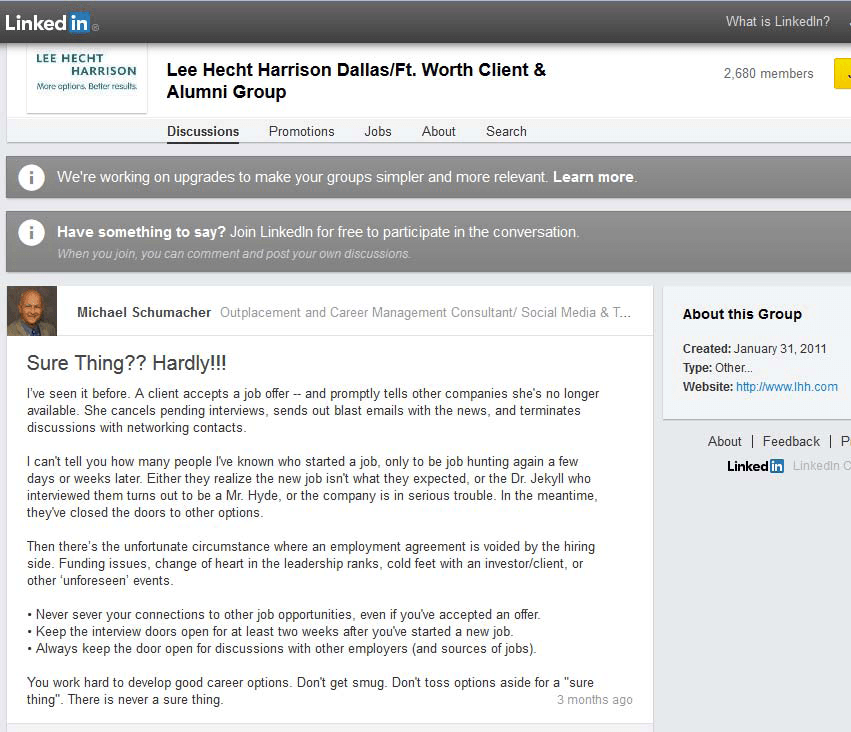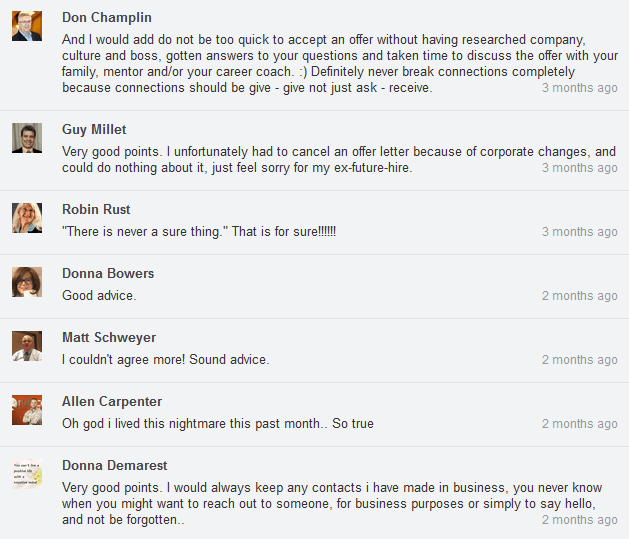Question
My husband and I were both downsized. Each of us has a good personal referral to a “hot” networking contact to whom we plan to send e-mails along with our resumes, but what do we say? My old company retained a big outplacement firm to help me, and they provided some sample letters. In these, the job seeker named the mutual acquaintance who provided the referral’s name, gave background and accomplishments as bullet points, and then either asked for the names of organizations which might be hiring or, in the case where the employer was known to be hiring, for a meeting to discuss qualifications.
Is this an adequate format for an introductory note, or do we need to do more research on the target company’s problems and how we can add value? I have been intrigued by your approach to job hunting. However, I don’t know how to apply this approach to a networking contact. Please give us some suggestions for writing our networking letters.
Nick’s Reply
 I’m not going to discuss what makes a company want to hire you. That’s something we address frequently in this column. You already have the idea: solve the company’s problems and challenges. But you can’t really do that with the person who might introduce you to your next employer. What I want to focus on is how not to squander a personal referral. If you follow the generic advice you’ve been given, you risk wasting that valuable contact. It’s like you’re burning money.
I’m not going to discuss what makes a company want to hire you. That’s something we address frequently in this column. You already have the idea: solve the company’s problems and challenges. But you can’t really do that with the person who might introduce you to your next employer. What I want to focus on is how not to squander a personal referral. If you follow the generic advice you’ve been given, you risk wasting that valuable contact. It’s like you’re burning money.
There is no cookie-cutter personal referral
Big outplacement firms have a business model. Their objective is not to help you land a good job. The goal is to sell multi-million dollar counseling contracts to big employers that are downsizing.
If your employer really wanted to help you, they’d arrange personal introductions to managers who need you. Outplacement firms don’t do that because it won’t win them a new gig. To win big contracts, these outplacement firms have to define a cookie-cutter process for handling thousands of newly unemployed people. (For example, Ford Motor Company is laying off 3,000 workers and will provide “significant help for the workers to find new jobs.”) And that’s what you’ve discovered in that sample cover letter. As you already realize, one size does not fit all.
Make a personal referral even more personal
The last thing you need is a canned approach to job hunting. You need to make it personal. And that takes time, careful thought and diligence. Every situation is unique, and these packaged methods you’ve been given aren’t likely to work well.
What will work? A customized approach that shows you are laser-focused on one job and one employer. Make a personal referral even more personal. Let me give you an example.
Establish your value
I wanted to meet the publisher of a big-name magazine. I needed a personal referral. So, first I sent a casual e-mail to one of his writers, with a carefully distilled, pithy comment about an article she wrote. I closed with an intelligent question that required her opinion about the subject. This resulted in several e-mails going back and forth between us in which I established my credibility.
I then asked her a smart question about something the publisher himself had written, and tied it to my own work. I did not reveal all the research I had done. It was implicit in the quality of my comments and question. I clearly knew what I was talking about, and I offered some thoughts that were valuable. That’s the real purpose of research: it enables you to add value, not to show off.
A few more exchanges, and she was confident that her boss would enjoy hearing from me (and she might score a few points with him). So she gave me his e-mail address and suggested I tell him about my ideas. (Please note: I never asked for the publisher’s address.)
Create a dialogue
I sent the publisher an e-mail. Subject=From Nick Corcodilos via [writer’s name]. He wrote back within an hour. We have corresponded a few times. I’ve given him information he can use in his work with no expectation of any return. I did not hint at what he might do for me. But he won’t be surprised if I pitch him an idea soon — or if I ask him for advice, for his business, or for other professional introductions. (That goes ditto for the writer!) The channel is open.
The sample networking letters you’ve been given are one-shot requests for help. By that I mean once you send the letter, the rest is up to the recipient, yet the only benefit is to you. Your polite request for job leads does not imply a dialogue. It’s one transaction.
But my e-mail to the publisher triggered a work-related dialogue that, right off the bat, offered potentially useful information to the recipient (and sort of put him in my debt). That publisher expects to talk shop with me again.
There is no canned note I could have sent him to accomplish that.
Make it a two-way street
It need not take long to cultivate this kind of contact. But such a valuable exchange cannot be stimulated with resumes or cover letters, which are asynchronous requests for a job. What I did is have a two-way, peer-to-peer exchange with the writer, and then with her boss. In both cases we talked about their work. People love to talk about their work. That’s where some of the very best offers to work together come from.
Stop thinking in terms of networking letters. Conventional networking is a selfish, one-sided practice that seeks a favor, a one-sided payout. The profit in the approach that I’ve described is in the two-way quality of communication, and in the pleasure of making a new friend. Everything else stems naturally from that, if anything happens at all.
Don’t squander a good personal referral
The truth is, a real job contact, a real personal referral, can arise from anywhere. You can go ahead and mail out those canned letters; one of them might pan out. But do you really want to squander a good contact because you didn’t cultivate it carefully, personally, and intelligently? Don’t burn money.
Before they turn to job postings and databases, managers hire people they know, like, and respect — even if they met only recently. Resumes and cover letters have absolutely nothing to do with engendering that kind of relationship. What I’ve described is how people make friends — and how you can cultivate a personal referral — in a professional context. Please try it.
If you have a “hot” networking contact, don’t waste it with a letter. Go talk shop, share your value, make a friend. Friends introduce friends to jobs.
How do you cultivate and use a personal referral to open doors and get you an audience with a hiring manager? Do you make it personal, or does that seem too awkward? Are there “magic words” you use? How does my approach differ from other “lead generation” methods you know of?
: :



 With the job market being more favorable to employers, they suggest that getting into the dialog too early can remove you from consideration quickly. While none of us wants to waste time going through the motions only to discover the salary may be too low, it may be more important to stay in the game as long as you can, getting them to like you. It gives you more of an opportunity to sell yourself, too.
With the job market being more favorable to employers, they suggest that getting into the dialog too early can remove you from consideration quickly. While none of us wants to waste time going through the motions only to discover the salary may be too low, it may be more important to stay in the game as long as you can, getting them to like you. It gives you more of an opportunity to sell yourself, too. If you think trying to be likeable and saying “I’m sure you’ll be fair” will help you “stay in the game” longer, you’re going to lose because the employer will take advantage of the fact that you invested all that time — and correctly surmise that you’re going to take whatever they offer you. This is one of the oldest psychological tricks used in negotiating — look up cognitive dissonance. People have a tendency to rationalize and accept lousy job offers because they’ve spent so many hours in interviews.
If you think trying to be likeable and saying “I’m sure you’ll be fair” will help you “stay in the game” longer, you’re going to lose because the employer will take advantage of the fact that you invested all that time — and correctly surmise that you’re going to take whatever they offer you. This is one of the oldest psychological tricks used in negotiating — look up cognitive dissonance. People have a tendency to rationalize and accept lousy job offers because they’ve spent so many hours in interviews.




